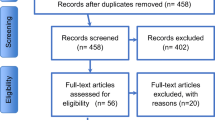Abstract
This study evaluated the influence of language of implementation on functional analysis outcomes for a child with a severe intellectual disability from a Spanish-speaking home. Challenging behavior was assessed during 5-min sessions under 4 conditions; attention, play-verbal, play-nonverbal, and demand and across 2 phases; implementation in English versus Spanish. The highest levels of challenging behavior occurred during the attention and demand conditions of the English phases. These results suggest that the language of implementation may influence the overall levels of challenging behavior within functional analysis conditions.

Similar content being viewed by others
References
Barlow, D. H., Nock, M. K., & Hersen, M. (2009). Single case experimental designs: Strategies for studying behavior change (3rd ed.). New York: Allyn & Bacon.
Bzoch, K. R., League, R., & Brown, V. L. (2003). Receptive-expressive emergent language test-third edition (REEL–3). Austin, TX: PRO-ED.
Call, N. A., Wacker, D. P., Ringdahl, J. E., & Boelter, E. W. (2005). Combined antecedent variables as motivating operations within functional analyses. Journal of Applied Behavior Analysis, 38, 385–389.
Fisher, W. W., Ninness, H. A. C., Piazza, C. C., & Owen-DeSchryver, J. S. (1996). On the reinforcing effects of the content of verbal attention. Journal of Applied Behavior Analysis, 29, 235–238.
Iwata, B. A., Dorsey, M. F., Slifer, K. J., Bauman, K. E., Richman, G. S. (1994). Toward a functional analysis of self-injury. Journal of Applied Behavior Analysis, 27, 197–209. (Reprinted from Analysis and Intervention in Developmental Disabilities, 2, 3–20, 1982).
Lang, R., O’Reilly, M., Machalicek, W., Lancioni, G., Rispoli, M., & Chan, J. M. (2008). A preliminary comparison of functional analysis results when conducted in contrived versus naturalistic settings. Journal of Applied Behavior Analysis, 41, 135–139.
Laraway, S., Snycerski, S., Michael, J., & Poling, A. (2003). Motivating operations and terms to describe them: Some further refinements. Journal of Applied Behavior Analysis, 36, 407–414.
McComas, J. J., Thompson, A., & Johnson, L. (2003). The effects of presession attention on problem behavior maintained by different reinforcers. Journal of Applied Behavior Analysis, 36, 297–307.
Mueller, T. G., Singer, G. H., & Grace, E. (2004). The individuals with disabilities education act and California’s proposition 227: Implications for English language learners with special needs. Bilingual Research Journal, 28, 231–252.
O’Reilly, M. F., Lacey, C., & Lancioni, G. E. (2000). Assessment of the influence of background noise on escape-maintained problem behavior and pain behavior in a child with Williams syndrome. Journal of Applied Behavior Analysis, 33, 511–514.
Sigafoos, J. (2000). Communication development and aberrant behavior in children with developmental disabilities. Education and Training in Mental Retardation and Developmental Disabilities, 35, 168–176.
Sigafoos, J., Arthur, M., & O’Reilly, M. (2003). Challenging behavior and developmental disability. London: Whurr.
Singer, G., Mueller, T., & Grace, E. (2003). Special education teacher beliefs and practices for English language learners with moderate and severe disabilities, UC LMRI FINAL GRANT REPORT #00–01G-SB. CA: Santa Barbara.
Thomas, W. P., & Collier, V. (2002) A national study of school effectiveness for language minority students’ long-term academic achievement. Report: ED475048, p. 337.
US Census Bureau. (2007). American community survey 1-year estimates: R1601. Percent of people 5 years and over who speak a language other than english at home. Retrieved June 2, 2009, from http://factfinder.census.gov/servlet/GRTTable?_bm=y&-geo_id=01000US&-_box_head_nbr=R1601&-ds_name=ACS_2007_1YR_G00_&-redoLog=false&-format=US-30&-mt_name=ACS_2006_EST_G00_R1601_US30.
US Census Bureau (2009) State and county quick facts. Retrieved December 17, 2010, from http://quickfacts.census.gov/qfd/states/48000.html.
Worsdell, A. S., Iwata, B. A., Conners, J., Kahng, S., & Thompson, R. H. (2000). Relative influences of establishing operations and reinforcement contingencies on self-injurious behavior during functional analyses. Journal of Applied Behavior Analysis, 33, 451–461.
Author information
Authors and Affiliations
Corresponding author
Rights and permissions
About this article
Cite this article
Rispoli, M., O’Reilly, M., Lang, R. et al. Effects of Language of Implementation on Functional Analysis Outcomes. J Behav Educ 20, 224–232 (2011). https://doi.org/10.1007/s10864-011-9128-7
Published:
Issue Date:
DOI: https://doi.org/10.1007/s10864-011-9128-7



